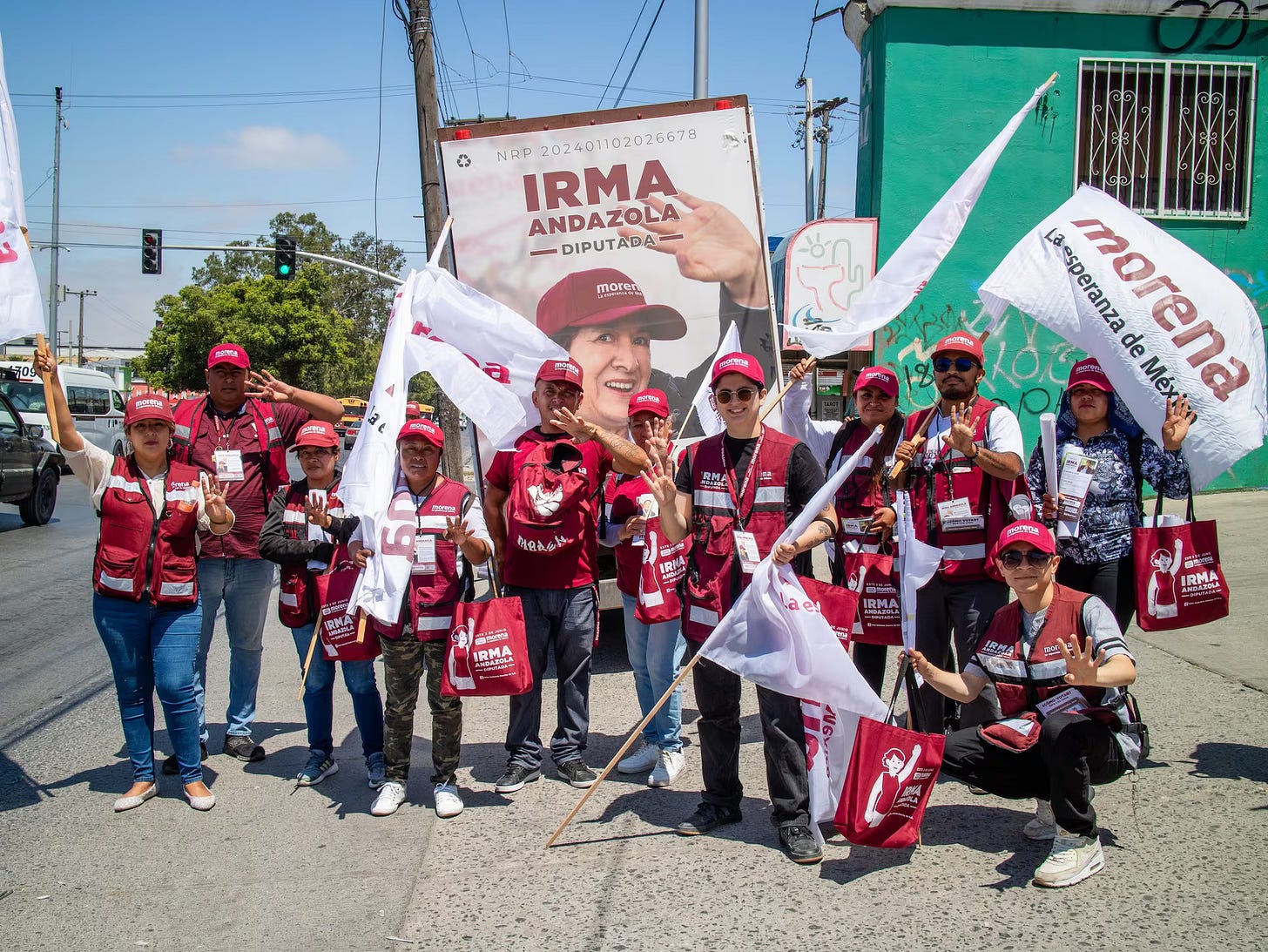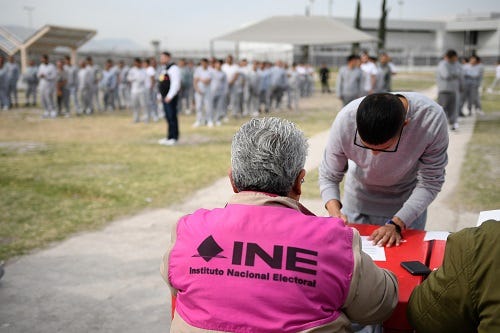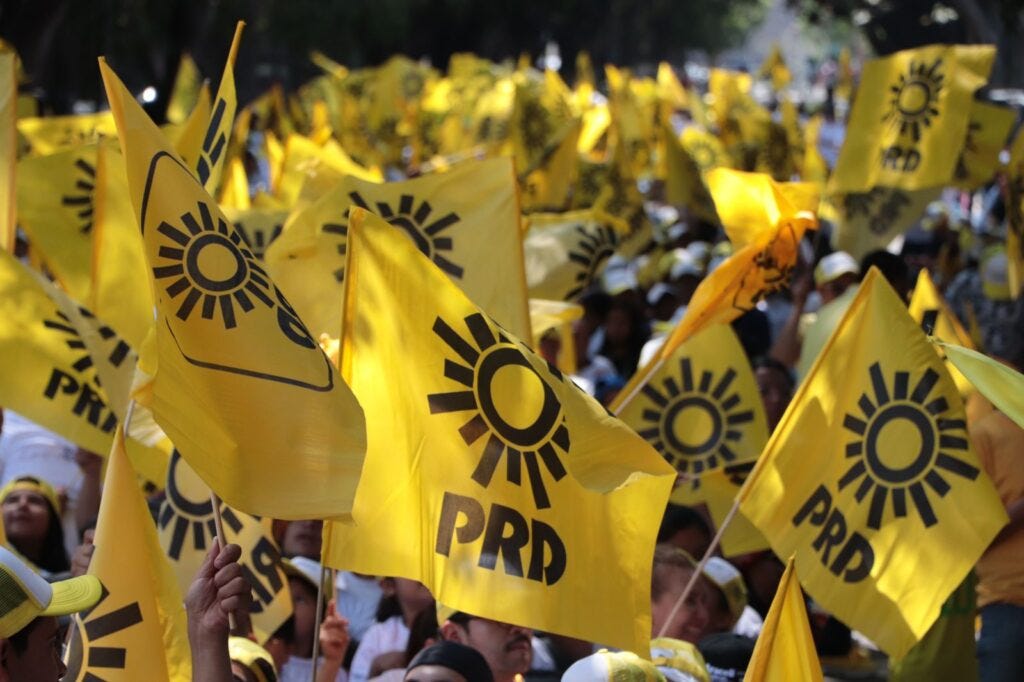The show must go on
An influencer loses, a dead candidate wins and a party dies
Welcome to a Sunday news roundup edition of The Mexpatriate.
The national conversation has continued to swirl around Claudia Sheinbaum and President López Obrador playing good cop, bad cop on judicial reform—she is planning dialogue with interested parties, he says they need to wrest control of the judiciary from criminals—while the markets have been moody, and the media doomy.
The peso did begin to recover this week, and has strengthened against the US dollar since Sheinbaum announced her initial cabinet appointments, including former Secretary of Foreign Affairs Marcelo Ebrard (and her erstwhile rival for the Morena presidential candidacy) as Secretary of Economy.

On Monday, Sheinbaum also revealed the results of various opinion polls commissioned by Morena to gauge public interest in their judicial reform proposal and how Mexicans feel about the judicial system. The responses were overwhelmingly in favor of an overhaul.
Is international concern about this reform justified? Will it spell the end of checks on executive power in Mexico? Or is this shakeup needed to clean out corruption?
More on these questions, and the history of other judicial reforms in Mexico, will be coming in my next deep dive.
But for now, more coverage of the election aftermath as the dust settles…and the rains begin!
How (not) to win votes and influence people
While the presidential race has of course hogged most of the media spotlight, there have been some interesting twists and turns to follow in local races.
In Jalisco, which ended up being one the tightest gubernatorial contests, Morena is challenging the election of Pablo Lemus of Movimiento Ciudadano (MC), after weeks of allegations of electoral misconduct fired from both sides. Lemus received 43.47% of the vote while Claudia Delgadillo of the Morena coalition got 38.21%.
In Monterrey, the second-biggest metropolitan area in the country, MC candidate Mariana Rodríguez is challenging her loss in the mayoral election to PAN-PRI-PRD candidate Adrián de la Garza (who has been mayor twice before). The 28-year-old influencer, fitness instructor and entrepreneur—and wife of the state’s governor, Samuel García—first shared news of her defeat on Instagram stories, admitting the “results don’t favor us” while applying mascara. She seemed about as disappointed as if a weekend brunch had been canceled.

This casual influencer style of politics is typical of Rodríguez, who once went viral with a video that demonstrated her lack of attention span for politics (or possibly, for her husband). She was filming García as he talked about which cities he was going to tour in his campaign for governor, then turned the camera back to herself and asked the viewers, “wanna see my new tennis shoes? Fosfo, fosfo.” The bright neon orange tennis shoes, and the phrase “fosfo, fosfo” turned into a campaign slogan not just for García, but for his political party.
In a profile published earlier this year by the magazine Gatopardo (titled “Rich, famous and political: The ascent of an influencer to power in Monterrey”), one journalist describes Rodríguez as drifting between “naive and Machiavellian,” and how she represents the archetypal “regia”—a colloquial term for people from Monterrey.
“I mean, in Mexico City people don’t get all made up to go to the movies like they do in Monterrey.”
However, by June 13, Rodríguez’s vibe had changed from “bummer” to “no one gets away with stealing elections from me.”
She held a press conference presenting 23 reasons she will challenge the election, including accusations of intimidation at polling stations, assault of various members of her campaign and tampering with electoral materials.
“...We can’t let the PRI and this electoral criminal, Adrián de la Garza, steal an election for the third time, steal the right to decide from the citizens of Monterrey.” In the final results, De la Garza (who was also García’s rival in the gubernatorial election in 2021) got 37.40% of the vote, and Rodríguez came in second with 30.76%.
Monterrey also made headlines during the campaign season with a debate so ridiculous that one outlet described it as political stand-up. The candidates fumbled through, launching poorly aimed insults in an embarrassing race to the bottom. Rodríguez came across as icy and superior throughout.
When each candidate was asked what is something he or she admires about another candidate, De la Garza said about Rodríguez: “If I had to choose something, I’d say her singing voice.”
When Rodríguez was asked the same question about her rival, she replied quickly and coldly: “Nothing.” Ouch.
Another candidate, Adalberto Madero (also a previous mayor of Monterrey)—insulted for his “dumb face” by an opponent at the debate—later made the news for falling off of a moving trailer as he tried to chat up the driver (who *apparently* didn’t realize he was there).
So what does all this mean for the photogenic political couple, prone to “frivolity” and “excess” in pursuit of power?

Since García returned as governor after the shortest presidential campaign in modern Mexican history (10 days) in November, he has faced repeated allegations of corruption and fraud (which he says are all politically motivated smear campaigns).
The investment project that he was hoping would catapult him into the stratosphere—Tesla’s gigafactory in Monterrey—still hasn’t broken ground. And now with his wife’s electoral loss, it seems their ambitions to represent “new politics” are taking a dive, or at least a dip. Rodríguez is even selling off some of her wardrobe online.
As wisely noted by columnist Carmen Morán Breña:
“New politics does not just mean using social media instead of traditional media, but offering different arguments, fresh ideas…The message to citizens can’t be that their votes just went down the drain; or to show to your political party that no one should lose sleep over losing one of the country’s great cities.”
Votes from prison
The 2024 elections can be called historic for many reasons, but one of the lesser-known ones was the participation of people held in pre-trial detention.
While the Mexican Constitution does permit citizens to vote even if under criminal investigation, in practice, this right has been ignored for those in prison pending trial. But this year, in 31 states (Yucatán was the only exception), prisoners could cast their vote for president, and also in three state-level elections in Mexico City, Chiapas and Hidalgo.
While the first two presidential debates were transmitted to prisons nationwide, on May 3, representatives from each candidate for mayor of Mexico City participated in the first-ever electoral debate conducted inside a Mexican prison.
“...What happened today was very exciting and practically an unprecedented exercise,” said Valentina Lloret, who works for a prisoner advocacy group (CEA-Justicia) that helped to organize the event in the Santa Martha Acatitla men’s prison in Iztapalapa. This is only the second such debate ever conducted in Latin America.
“Inevitably, to be surrounded by gray walls, with towers and armed guards, generates tension, but I think this is also something important to experience,” said the moderator, journalist Luisa Cantú, in an interview with El País. She felt the debate brought up topics that “normally are made invisible.”
The single topic chosen for the debate was “the care of families of prisoners in pre-trial detention,” but the participants veered off-topic frequently, echoing instead the same talking points and accusations heard in the CDMX mayoral debates.

According to the most recent INEGI data, there were 88,172 Mexicans held in pre-trial detention across the country in 2022—meaning 39% of the prison population has yet to be tried and sentenced. In far too many cases, they have been in prison for years pending trial.
The National Electoral Institute (INE) found 30,947 of these prisoners were eligible to vote in this year’s elections.
Nayomi Aoyama, coordinator of prison programs at an NGO called Documenta, said enabling these citizens to vote is essential for two reasons:
“…The first is the recognition of presumption of innocence, which is fundamental…and the other is that it can help place them [prisoners] as important agents in society, so that what happens inside prisons is not completely removed from what’s happening on the outside.”
Ángela Guerrero, director of CEA-Justicia, sees these efforts to expand voting rights as “small counterweights against the penal populism in the region.”
According to the final election results, 26,667 people voted from prison and Morena received 46.6% of national votes, followed by the PRI (13%) and Movimiento Ciudadano (11.9%). Morena also won the most votes from prisoners in the Mexico City mayoral election, which was won by the party’s candidate, Clara Brugada.
Morena did well with this population, even though one of the party’s current policy platforms is to continue upholding the use of mandatory pre-trial detention. However, they obtained a lower percentage of the vote than in the general presidential election (59.76%).
A dead woman won an election in Tijuana
In one of the more bizarre stories to come out of the elections, a woman named Irma Andazola was reelected to represent her district in Tijuana in the federal House of Deputies with 60.5% of the vote—however, Andazola was dead when the votes were cast.
Andazola’s campaign had continued after her death in a hospital on May 23, without any acknowledgement of her demise, until a Morena representative confirmed to local media on June 1 (the day before the election) that Andazola had died. According to the representative, the party had only found out hours before.

Local media later reported a malignant tumor and arterial hypertension caused the candidate’s death at age 60. “My mother was attacked by a very aggressive cancer that neither her doctors nor her family expected,” read a message posted by her daughter Diana Cano on social media. She apologized for not communicating this information, saying her priority had been to attend to her 74-year-old father’s health in the aftermath of her mother’s sudden death.
While Adriana del Pilar Reyes García, Andazola’s daughter-in-law, had been listed as her substitute, Morena ended up naming another candidate from Ensenada to take the deputy’s place. The family has criticized the decision and reports they have received threats since the news of Andazola’s death broke.
Andazola had been a member of Morena since its founding, and was apparently widely respected in her district, which is one of the poorest in Tijuana. She continued to live in District 4 and understood its needs.
“People here live in economic insecurity, and she always cared, especially about the elderly,” said Angélica Ramírez, a friend who was interviewed by newspaper El País. “She was also one of the first ones to believe in us [the search collectives], and in creating brigades to search for the disappeared…she always supported us, she helped us by talking to governors, writing requests, making appointments.” Andazola had earned her law degree online, graduating at 51.
“She worked hard and was a fighter, she was clear in her ideals and also always fought for her party, to defend it.”
Obituary for a political party
The losses on the June 2 battlefield now include the Partido de la Revolución Democrática (PRD), once the party of López Obrador and the home of the Mexican left.
On June 14, the party’s leader Jesús Zambrano admitted the PRD “no longer exists as it did”—the PRD only received 1.86% of the vote in the presidential election, and also came in below the 3% minimum threshold in the congressional elections.
The PRD “played an important role in its time,” said López Obrador on Monday in response to the news.
Born in the aftermath of the contentious 1988 elections (with the infamous “se cayó el sistema” moment), the PRD became an umbrella for various groups of the left, ranging from urban student movements, to labor unions to rural agricultural workers. Its institutional foundation was always precarious, but the disparate interests were united by the revered figure of Cuauhtémoc Cárdenas, who lost to Salinas in 1988.
After AMLO became the party’s president in 1996, it expanded its territorial presence, reaching its political zenith during his presidential campaign of 2006—which was also its most painful blow. The party had won 35.31% of the popular vote, an unprecedented achievement for the left, and yet Felipe Calderón was named the winner, with a mere 0.58% advantage. The protests from the PRD were loud and persistent, and AMLO was even “sworn in” symbolically as president by his supporters in the Mexico City Zócalo in November of that year.

In 2006, the PRD did win the Mexico City mayoral race (following on AMLO’s win in 2000), with the election of Marcelo Ebrard. AMLO would go on to represent the party in the presidential election of 2012, but lost to Enrique Peña Nieto (PRI). That same year, the PRD joined the PRI and the PAN in the “Pacto por México,” a political agreement among former bitter antagonists to work together to develop and enact sweeping reforms. AMLO saw this as a betrayal of the PRD’s values, particularly the privatization of the petroleum industry—deriding it as the “Pacto contra México”—and he left the party, founding Morena in 2014.
The PRD lost its thunder, and its way, with the departure of its charismatic leader. Between 2006 and 2018, the PRD went from having 26 to eight senators and 127 deputies to just 21 in the federal Congress.
“Suicide isn’t always unnatural,” says Agustín Basave, a former PRD leader, academic and fierce critic of AMLO, when interviewed about the death of the party, explaining that “the internal conflicts between the different ‘tribes’ [within the party] became more and more savage.”
Meanwhile, the PRI—whose death has been prematurely reported many times—is still holding on. National leader Alejandro “Alito” Moreno said on June 14 that “we will have a profound, very big reform” of the party, even suggesting there could be changes to the name and the party colors. It seems yellow is now available.
Thank you for reading! Please send me your feedback or suggestions at hola@themexpatriate.com, or leave a comment below. And if you enjoy my work, please consider supporting The Mexpatriate with a paid subscription:




Oh, my! And I thought the U.S. election was a circus. Your writing is not only incisive, but, in this issue, downright funny. News with a twist and a punchline. Keep up the good work. I always look forward to The Mexpatriate. God Bless the United States and Viva Mexico. Thanks for keeping us informed. sbs1225